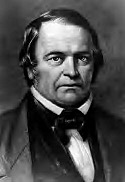 The 1840s saw some mighty strange behavior in Maine—much of it inspired by the teachings of William Miller of New York.
The 1840s saw some mighty strange behavior in Maine—much of it inspired by the teachings of William Miller of New York.Miller calculated that the Second Coming of Christ would occur on Oct. 22, 1844, prompting his multitude of followers to prepare for the end. (Miller had earlier promised that the Second Coming would occur between Mar. 21, 1843, and Mar. 21, 1844, but adjusted his calculations when the latter date came and went.) The Great Disappointment of Oct. 22 was probably felt most deeply by Millerites like these:
A man named Spalding convinced a number of residents of Lexington, Maine, that the end was nigh.
They have consequently neglected the cultivation of their farms the past spring, possessing provisions sufficient to carry them through the present year. [Barre (Vt.) Gazette of July 8, 1842]Some farmers tore down their fences for firewood, believing that they soon would be unnecessary.
Under the heading "Millerism in Maine," the Barre Gazette of May 9, 1845, described the activities of some adherents.
One exercise is for some of them to get on their hands and knees on the floor, while others sit astride of their backs. Washing each other's feet, kissing and embracing each other, are other forms. They have an exercise called "holy rolling," and another "slain of the Lord," when they fall upon the floor apparently helpless. In this state some of them give warnings, and relate visions, and recite doggerel rhymes.
Frequent baptisms are observed—some at midnight and some personal. The latter has been recently performed by certain worthy and highly accomplished young women, by jumping and rolling in pools of water by the road side. Little children have been seized and carried out into the night air and plunged into a neighboring brook. Various means are resorted to for the purpose of making sacrifices. One woman took her china tea set, and broke it into small pieces.William B. Lapham in his History of Woodstock wrote of their "most ludicrous, not to say disgusting" behavior at meetings, at which they expressed their literal interpretation of the Biblical warning, "Except ye be converted, and become as little children, ye shall not enter into the kingdom of heaven."
The floor was covered with straw, and upon it men and women, boys and girls would roll and tumble promiscuously, imitating, to the best of their ability, the language and acts of young children. If they were traveling upon the highway and happened to meet anyone not of their own belief, they would get down on their hands and knees and creep in the sand, imitating the sounds and motions of children who were too young to walk. Feet washing was one of the observances in the tent, the hair being used as a towel. Sometimes a person would wake up in the night, pretending to be impressed with the duty to go and wash somebody's feet in a distant part of the town, and, faithful to the impression, he would immediately go to the place indicated, call the person up, perform the ceremony and return home. One man lost a child by death, and kept the remains in the house several months, with the expectation of being able to raise it from the dead. This man became violently insane and died by his own hand, a sad commentary on the form of faith he had embraced. [p. 84]Many untrue stories about Millerism were undoubtedly spread by its enemies, and many cases of pure insanity blamed on it. Perhaps the most heinous crime attributed to Millerism occurred on May 11, 1848, in Edgecomb. A Mr. Pinkham, ship carpenter, decapitated his wife and four young children with an ax before taking his own life with a razor. The Miller connection was reported in the Bath Times of May 13.
It appears that Mr. and Mrs. Pinkham had been victims of the Miller delusion; but the full force of its crushing influence upon their spirits seems not to have been suspected by others. The paper to which we have referred, an exact copy of which was seen by our informant, contained a statement in the hand writing of Mrs. P., followed by another by her husband, setting forth that they had become tired of life; that there was nothing in prospect worth living for, and that they had mutually agreed upon the destruction of themselves and their children; requesting that their bodies might be deposited in a stone tomb.
No comments:
Post a Comment